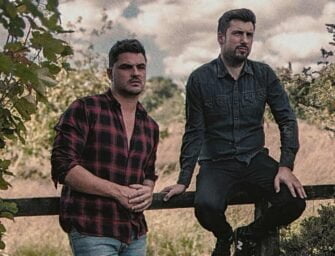
Stereophonics’ Kelly Jones on Dakota: “I even sang the guitar riff into a tape recorder, and I’d play that cassette on the tour bus because I loved it so much”
The Welsh rock group’s main man recalls how their summery chart-topping single actually emerged on a snowy day in Paris, and would’ve had a different title if it wasn’t for Slipknot
Born and raised in Cwmaman, South Wales, singer-songwriter Kelly Jones is the gravel-voiced frontman of the rock band Stereophonics. Since forming in 1992 with bassist Richard Jones and the late Stuart Cable on drums – now with drummer Jamie Morrison and guitarist Adam Zindani – the group has achieved more than 10 million sales, six No 1 albums and 11 Top 10 singles, along with 23 platinum sales awards, five BRIT nominations and one BRIT Award win.
Dakota was the first single taken from their fifth studio album, Language. Sex. Violence. Other? It was the first – and to date only – Stereophonics single to reach No 1 on the UK Singles Chart and to chart on the US Billboard Modern Rock Tracks chart. It also became the band’s highest-charting single in both Australia and New Zealand.
We caught up with Kelly in his studio in London’s Shepherds Bush, where he was rehearsing for a solo tour, and got to know how the chart-topping single emerged…

Released: 28 February 2005
Artist: Stereophonics
Label: V2
Songwriters: Kelly Jones
Producers: Kelly Jones, Jim Lowe
UK chart position: 1
US chart position: –
“Lyrically, I’d always just write whatever I was going through at that point in time, I never tried to fake it, I never tried to make it up too much, or overthink it. The approach would be to always let it come. Sometimes you have to force it a bit, but generally, I would try to get as many things as I could prior to going into the studio. I don’t think I’ve ever booked a studio without songs, ever – that’s not really the way I work.
“Ironically, I was in a hotel room in Paris, it was snowing and I wrote [Dakota] on an acoustic guitar – the music, the chords. I knew the minute I wrote the melody and the line ‘You make me feel like the one’ came out of my mouth, I text the head of the label V2 at the time and said, ‘I think I’ve got a big song’. That was the first time I’d ever done that and I don’t think I’ve done it since, either. I just felt that what it was saying… I even sang the guitar riff into a tape recorder, and I’d play that cassette on the tour bus because I loved it so much – there wasn’t anything on it apart from me mumbling along! So there was something about it that just captured me.
“Then we came home from Europe and finished the lyrics, and went on tour with David Bowie, we did his last tour across America – the Reality tour – and I bought an old Fender Mustang ‘Racing Stripe’ series. I was just playing that in the dressing room on the bus and the hotels all the time, which is probably where I got the idea of the Fender thing, actually. So I was playing that and we were actually in South Dakota, I think it was Vermillion, and I just remember finishing the lyrics, trying to write about a lost love and wondering where she was now, and that kind of stuff. There was no scribbling out on the page at all (I’ve still got the book) and it just came out. I just had to figure out what ‘You make me feel like the one’ meant, because I already had that and I knew it was a great line – I didn’t know where it came from or what it was, but I had to piece three verses around it.

Stereophonics: Dakota was their first single to reach No 1 on the UK Singles Chart
“It’s a strange song because it’s only got two choruses and almost a third chorus at the end, so it’s kind of a long song for a No 1 single. I added the synthesizer thing at the end and I recorded the demo in three-and-a-half hours – it was very, very fast. It was actually called ‘Vermillion’, right up until we almost printed it, then Slipknot were bringing out an EP called Vermillion, so we said, ‘Oh fuck it, call it Dakota,’ and that’s how it went!
“With our first two records through the 90s, we’ve had a big song on every album, right up to present day. And now there are all these 15- and 16-year-old kids coming to the show and they love songs like C’est La Vie. But when we play Dakota, more so than any song, in any country… I remember the first time we played it in the arenas, after it went to No 1, and it was like nothing I’d ever experienced: that group mentality of every single person in the room being affected by something. It’s very, very strange and very powerful, and it’s never subsided – there’s nowhere else we can put it [on the setlist] apart from at the end of the show, because if you put it anywhere else whatever comes after it is fucked! Thankfully it came through me, and thankfully I recorded that one.”








![Songwriting Credits… best new music playlist [September 2023]](https://www.songwritingmagazine.co.uk/wp-content/uploads/songwriting-credits-september-2023-335x256.jpg)






























Related Articles